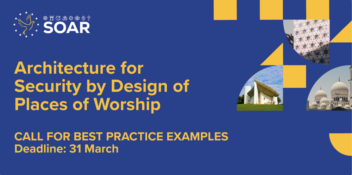The EU funded SOAR Project has released a call for proposals detailing best practice architectural examples to promote and advance the expertise of European architects in Security by Design of public spaces and in particular religious buildings in their urban context.
The call for best practice examples of religious architecture as part of public space in Europe invites entries of new buildings and ensembles, as well as conservation, restoration, and interventions on existing structures. Works must have been completed under the oversight of a qualified architectural team. The submitted projects will be assessed by the professional jury appointed within the SOAR programme. The selected projects will be exhibited and featured in a booklet of ‘Best Practice Examples’ and on the SOAR project website. Additionally, they will assist in developing design guidelines to improve security of religious sites.
ELIGIBILITY
Architectural practices of any size are welcome to join and submit their best built project (one project per firm maximum). The projects can be places of worship of any faith (synagogue, church, mosque, temple etc.), which demonstrate the application of SBD concepts and can be either new constructions or renovations. The buildings must be completed and should be located in Europe, in any country which is eligible for participation within the EU funding scheme for the SOAR programme. (1)
(1) Countries eligible: Austria, Belgium, Bulgaria, Croatia, Republic of Cyprus, Czech Republic, Denmark, Estonia, Finland, France, Germany, Greece, Hungary, Ireland, Italy, Latvia, Lithuania, Luxembourg, Malta, Netherlands, Poland, Portugal, Romania, Slovakia, Slovenia, Spain and Sweden + Norway, Switzerland and UK.
EVALUATION CRITERIA
The jury will select up to 20 projects, based on the following general criteria:
-
- Quality of the architectural design based on the Davos Declaration: functionality, environment, economy, diversity, context, sense of place and beauty (2)
- Governance, illustrated by the religious community in charge of the project; (2)
- Effective (visible and invisible) security design elements for the benefit of users, worshipers and the general public;
- Whenever possible, the architects considering a submission should reflect current advice and guidelines available or published through EC sources. For further information please visit: davosdeclaration2018.ch/davos-declaration-2018 For further information please check the following EC sources: ec.europa.eu/jrc/en/protection-public-spaces-from-terrorist-attacks and b) op.europa.eu/en/publication-detail/-/publication/998aeb09-4be6-11e9-a8ed-01aa75ed71a1/language-en
SUBMISSION MATERIAL
-
- Short presentation of the project explaining the security needs and how your concept responds to it, including geographical context, architectural concept, selection of relevant plans, sections, and photos. Format accepted: PDF. Maximum 10 A4 pages.
- One A1 vertical will be requested in case your project is selected for the exhibition.
- Please do not include any security-sensitive information in your submission.
- A consent form by the community person in charge of the religious is highly recommended.
- Submitted material should be in English or French.
JURY
-
- Dr. Szabó Csaba – University lecturer – Doctoral School of Police Sciences and Law Enforcement (Hungary)
- Daria Grouhi – Director at Kuehn Malvezzi Architects (Germany)
- Dr Selma Harrington – Architect and Member of the Executive Board, Architects’ Council of Europe (Ireland)
- Norman Lamisse – Managing architect of the Civil Society of Architecture LAMISSE, Senior architect at ENTR’AXES ARCHITECTES (Belgium)
- Wolfgang Lorch – Architect and Professor of Design and Building Design at TU Darmstadt (Germany)
- Dr. Ferenc Makovényi – Managing Director at Pannon Termál Projekt Kft (Hungary)
- Bénédicte Selfslagh – World Heritage & Cultural Heritage Expert (Belgium)
- Hans Scheving – Architect and Partner at bertelsen & scheving architects (Denmark)
- More jury components TBA
IMPORTANT INFORMATION AND TIMELINE
-
- January 2022 Launch of the call
- 31 March 2022, 12:00 CET: Submission Deadline
- May 2022: Winners to be announced at a SOAR event
- End 2022: Publication and exhibition
Please send your project material (including the presentation and the A1 file) to info@ace-cae
WHAT IS THE SOAR PROJECT?
The EU-funded project SOAR stands for ‘Strengthening the security and resilience of at-risk religious sites and communities’. It aims at increasing the awareness of, and capacity to prevent and mitigate physical and human security threats to places of worship through Security by Design (SBD). The concept of ‘Security by Design’ incorporates security features into the design and fabric of the building and its urban context.
The project partners Enhancing Faith Institutions (EFI), the Network for Religious and Traditional Peacemakers, and the Architects’ Council of Europe (ACE) cooperate in this endeavour with an extensive network of professionals, including representatives from all majority and minority faiths practicing within the EU. The project is supported by the United Nations Alliance of Civilisations. SOAR provides a unique knowledge base on security by design to its our audiences. This includes training, guidance, and online resources, with the opportunity for engagement and the evolution of virtual networks and communities of practice. Security training is delivered across the full spectrum of the project at EU, national, regional and local settings. The project team works first in seven pilot EU member states: France, Germany, Belgium, Hungary, Austria, the Netherlands and Denmark. Experts in the fields of SBD such as public authority planners, architects, and designers, as well as faith leaders provide support, training and risk assessments in the seven pilot countries.

